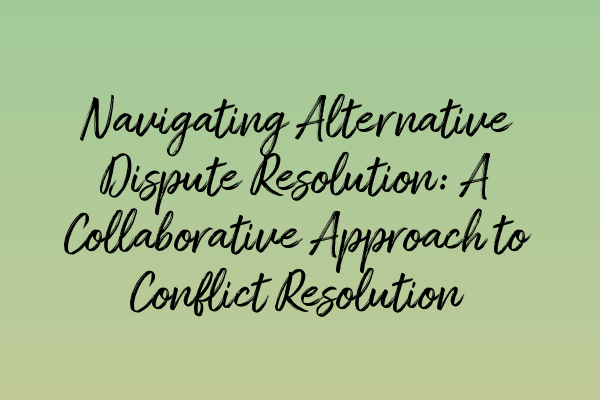Navigating Alternative Dispute Resolution: A Collaborative Approach to Conflict Resolution
In the legal field, conflicts and disputes are an inevitable part of the process. Whether it’s a personal injury claim, a contractual disagreement, or a family matter, finding a resolution that satisfies all parties involved can be a challenging and time-consuming process. Traditional litigation can often intensify conflicts and lead to lengthy court battles, which are not only expensive but also emotionally draining for all parties.
However, there is an alternative approach to resolving disputes that offers a more collaborative, efficient, and cost-effective solution. It’s called Alternative Dispute Resolution (ADR), and in this article, we will explore how it can be navigated to achieve a successful outcome.
What is Alternative Dispute Resolution?
Alternative Dispute Resolution refers to a variety of methods used to resolve conflicts outside of the courtroom. It is often used as an alternative to litigation or as a means to supplement the court process. ADR methods include negotiation, mediation, arbitration, and conciliation. Each method has its own unique characteristics and advantages, but they all share a common goal: to find a resolution that satisfies all parties involved.
Negotiation: The Foundation of ADR
Negotiation is the most basic form of ADR and involves a direct exchange of proposals and counter-proposals between the parties in conflict. It allows parties to communicate their needs, interests, and concerns and work towards a mutually acceptable agreement. Negotiation can be done with or without the assistance of legal representatives, depending on the complexity of the dispute.
Mediation: Facilitating Communication and Collaboration
Mediation is a structured process in which a neutral third party, known as the mediator, helps facilitate communication and negotiation between the parties. The mediator does not make decisions but instead assists the parties in exploring their options and reaching a voluntary agreement. Mediation is particularly effective in resolving disputes involving family matters, workplace conflicts, and commercial disputes.
Arbitration: A Private and Binding Resolution
Arbitration is a more formalized form of ADR in which the parties agree to submit their dispute to a neutral third party, known as the arbitrator. The arbitrator reviews the evidence and arguments presented by both parties and makes a legally binding decision. Unlike mediation, arbitration resembles a court proceeding, but it offers a more streamlined and efficient process, often with less formal rules of evidence and procedure.
Conciliation: Balancing Facilitation and Decision-making
Conciliation combines elements of mediation and arbitration. A conciliator, like a mediator, helps parties communicate and explore options for resolution. However, if an agreement cannot be reached, the conciliator can take on a more active role and make recommendations or suggestions for resolution. Conciliation is often used in disputes involving labor and employment matters, as well as community conflicts.
The Benefits of ADR
There are several advantages to utilizing ADR methods in the resolution of conflicts. First and foremost, ADR offers a more collaborative and less adversarial approach to conflict resolution. Parties have the opportunity to actively participate in finding a solution, which can lead to more satisfaction with the outcome and better long-term relationships.
Additionally, ADR methods are generally faster and more cost-effective compared to traditional litigation. Court proceedings can take months or even years to resolve, whereas ADR can often lead to a resolution in a matter of weeks. This can save parties substantial time, money, and emotional stress.
Moreover, ADR allows parties to maintain confidentiality and privacy. Unlike court proceedings, which are generally open to the public, ADR processes can be kept confidential, protecting sensitive information and reputations.
Navigating ADR Successfully
To navigate ADR successfully, it is essential to approach the process with a collaborative mindset and a willingness to engage in open and honest communication. Parties should also carefully choose their ADR method and the neutral third party involved. Selecting an experienced mediator or arbitrator who specializes in the specific type of dispute can greatly increase the chances of a favorable outcome.
At Become Solicitor SRA, we understand the complexities of conflicts and disputes and the benefits of using ADR to find effective solutions. Our team of expert solicitors has extensive experience in guiding clients through the ADR process and achieving successful outcomes.
If you are facing a conflict or dispute and would like to explore the possibility of utilizing ADR, contact us today. Our solicitors will assess your case and provide you with the guidance and support you need to navigate alternative dispute resolution effectively.
Related Articles:
– Private Prosecutions: Exploring Non-Governmental Prosecutions in Criminal Cases
– Understanding Drug-related Offences: Laws and Penalties in the UK
– Demystifying Criminal Law Procedures: A Step-by-Step Guide
– Rights of the Accused: Protecting Individual Liberties in Criminal Proceedings
– Magistrates’ Court vs Crown Court: Understanding Key Differences


Leave a Reply